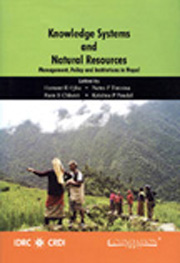Book contents
- Frontmatter
- Contents
- Preface
- Abbreviations
- Glossary of Nepali Words
- 1 Knowledge Systems and Deliberative Interface in Natural Resource Governance: An Overiew
- 2 Agricultural Technology Development in Nepal: Critical Assessment from Knowledge System Perspective
- 3 Contested Knowledge and Reconciliation in Nepal's Community Forestry: A Case of Forest Inventory Policy
- 4 From Grassroots to Policy Deliberation: The Case of Community Forest Users' Federation in Nepal
- 5 From Isolation to Interaction: Increasing Knowledge Interface in Chhattis Mauja Irrigation system in Nepal
- 6 Action Research Experience on Democratising Knowledge in Community Forestry in Nepal
- 7 Culturally Embedded Knowledge in Irrigation: People's Ways of Thriving in a Himalayan Village
- 8 Deliberative Knowledge Interface: Lessons and Policy Implications
- About the Contributors
4 - From Grassroots to Policy Deliberation: The Case of Community Forest Users' Federation in Nepal
Published online by Cambridge University Press: 26 October 2011
- Frontmatter
- Contents
- Preface
- Abbreviations
- Glossary of Nepali Words
- 1 Knowledge Systems and Deliberative Interface in Natural Resource Governance: An Overiew
- 2 Agricultural Technology Development in Nepal: Critical Assessment from Knowledge System Perspective
- 3 Contested Knowledge and Reconciliation in Nepal's Community Forestry: A Case of Forest Inventory Policy
- 4 From Grassroots to Policy Deliberation: The Case of Community Forest Users' Federation in Nepal
- 5 From Isolation to Interaction: Increasing Knowledge Interface in Chhattis Mauja Irrigation system in Nepal
- 6 Action Research Experience on Democratising Knowledge in Community Forestry in Nepal
- 7 Culturally Embedded Knowledge in Irrigation: People's Ways of Thriving in a Himalayan Village
- 8 Deliberative Knowledge Interface: Lessons and Policy Implications
- About the Contributors
Summary
Introduction
This chapter discusses the emergence of the Federation of Community Forestry Users, Nepal (FECOFUN) and its contribution to the process of participatory and deliberative governance in the forestry sector of Nepal. In particular, this chapter discusses how the forest dependent civil society groups were able to enhance their deliberative interface with various groups of actors engaged in the field of forestry, mainly: technobureaucrats, formal political agents (mainly political parties) and development agencies. The purpose is to explicate conditions and processes that enable or constrain the ability of local forest-dependent citizens to participate in the policy and practice of forest governance.
Despite repeated pleas for the participatory and deliberative governance of environmental resources (Fischer 1999; Dryzek 2000; Fischer 2000; Smith 2003; Ojha 2006; Parkins and Mitchell 2005), there is still a predominance of technocratic values and institutions in environmental decision-making (Backstrand 2004; Pokharel and Ojha 2005). This is especially true in the context of forest management in the Global South where centralised and technically-oriented colonial approaches of the past continue to dominate the day to day practices of forest management, policies and their implementation (Peluso 1992; Shivaramakrishnan 2000; Sundar 2000, 2001; Roth 2004; Sarin 2005). The rhetoric of decentralisation and devolution of forest management have often been couched in an agenda of extending bureaucratic control rather than advancing the genuine empowerment of the local people (Shrestha 1999; Sarin et al. 2003; Shrestha 2001).
- Type
- Chapter
- Information
- Knowledge Systems and Natural ResourcesManagement, Policy, and Institutions in Nepal, pp. 60 - 85Publisher: Foundation BooksPrint publication year: 2007
- 1
- Cited by

